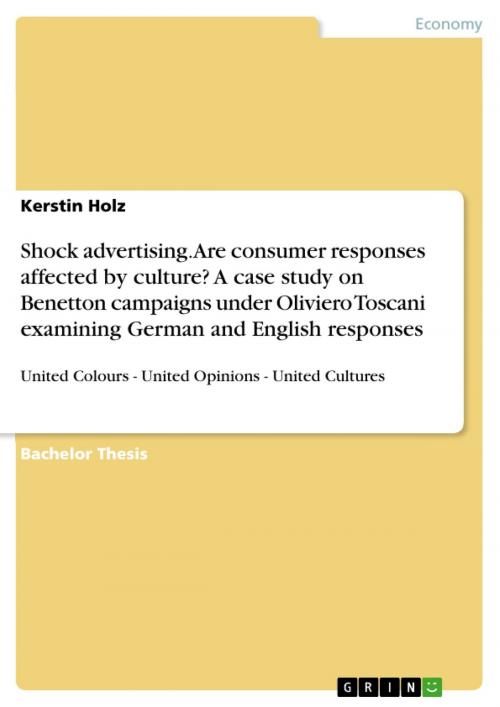Shock advertising. Are consumer responses affected by culture? A case study on Benetton campaigns under Oliviero Toscani examining German and English responses
United Colours - United Opinions - United Cultures
Business & Finance, Marketing & Sales| Author: | Kerstin Holz | ISBN: | 9783638607612 |
| Publisher: | GRIN Publishing | Publication: | March 4, 2007 |
| Imprint: | GRIN Publishing | Language: | English |
| Author: | Kerstin Holz |
| ISBN: | 9783638607612 |
| Publisher: | GRIN Publishing |
| Publication: | March 4, 2007 |
| Imprint: | GRIN Publishing |
| Language: | English |
Bachelor Thesis from the year 2006 in the subject Business economics - Marketing, Corporate Communication, CRM, Market Research, Social Media, grade: First class, University of Birmingham, 55 entries in the bibliography, language: English, abstract: This research aimed to show whether responses to shock advertising campaigns are influenced by culture The aim and objectives for this research included to analyse the techniques and impact of shock advertising, evaluate the cultural characteristics of Germany and England in relation to the perception of advertising, analyse the impact of four selected campaigns on Benetton's financial performance and to critically evaluate the extent to which culture influences the acceptance of shock advertising through focus groups/questionnaires. The gathered data from questionnaires and focus groups was then compared and contrasted against the findings from secondary sources as well as against each other. The comparison of the three types of research showed that differences between both cultures exist. Both countries have different approaches towards the Benetton campaigns: Germany strategically and England emotionally. This does not necessarily mean they respond differently to them, although research has shown that, as opposed to data gathered in the secondary literature, Germany responded more tolerantly and openly to the campaigns than expected, whereas England, expected according to the secondary literature to understand advertising based on creativity, did just the opposite. The English group rated the shock factor more strongly than the German group, proving that responses to shock advertising are dependent on cultural influences. The results from this research therefore show that responses to these campaigns are affected by culture especially in emotional campaigns such as the Benetton ones and companies should take these differences into account. Obviously it is cheaper and easier to run a standardized global campaign; however, this does not take different cultures in different countries into account which might harm brand perception due to misunderstandings and different decoding approaches. The phenomenon of globalisation will be of great interest for further research as it brings cultures closer together. The research, over a larger timeframe, might show how cultures are becoming more similar and therefore a standardised advertising strategy might be more useful than ever.
Bachelor Thesis from the year 2006 in the subject Business economics - Marketing, Corporate Communication, CRM, Market Research, Social Media, grade: First class, University of Birmingham, 55 entries in the bibliography, language: English, abstract: This research aimed to show whether responses to shock advertising campaigns are influenced by culture The aim and objectives for this research included to analyse the techniques and impact of shock advertising, evaluate the cultural characteristics of Germany and England in relation to the perception of advertising, analyse the impact of four selected campaigns on Benetton's financial performance and to critically evaluate the extent to which culture influences the acceptance of shock advertising through focus groups/questionnaires. The gathered data from questionnaires and focus groups was then compared and contrasted against the findings from secondary sources as well as against each other. The comparison of the three types of research showed that differences between both cultures exist. Both countries have different approaches towards the Benetton campaigns: Germany strategically and England emotionally. This does not necessarily mean they respond differently to them, although research has shown that, as opposed to data gathered in the secondary literature, Germany responded more tolerantly and openly to the campaigns than expected, whereas England, expected according to the secondary literature to understand advertising based on creativity, did just the opposite. The English group rated the shock factor more strongly than the German group, proving that responses to shock advertising are dependent on cultural influences. The results from this research therefore show that responses to these campaigns are affected by culture especially in emotional campaigns such as the Benetton ones and companies should take these differences into account. Obviously it is cheaper and easier to run a standardized global campaign; however, this does not take different cultures in different countries into account which might harm brand perception due to misunderstandings and different decoding approaches. The phenomenon of globalisation will be of great interest for further research as it brings cultures closer together. The research, over a larger timeframe, might show how cultures are becoming more similar and therefore a standardised advertising strategy might be more useful than ever.















